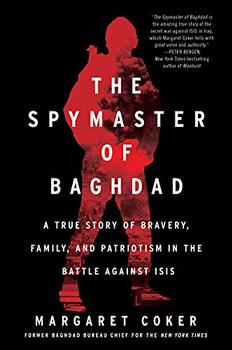Summary | Excerpt | Reading Guide | Reviews | Beyond the Book | Readalikes | Genres & Themes | Author Bio

A True Story of Bravery, Family, and Patriotism in the Battle against ISIS
by Margaret Coker
Harith took one look at their mother, pale and helpless, propped up on pillows on the floor. He knew that if he defied his father, he might as well kill his mother with his own hands. Either way, he would be responsible for her suffering.
May God forgive me, Harith said softly. Father, you win. I will forget Nisreen.
Years later, when discussing the event, the al-Sudani brothers remember the moment in which something vital inside Harith died.
Chapter 2
A Chance for Freedom
The news spread like joy at a wedding, its potency increasing as it swept across the trash-strewn lots of Saddam City. Throughout Baghdad, every military barracks, every office of Saddam's secret police and ruling party had been abandoned. The torturers had fled, the dictator was in hiding, and American tanks were in the streets.
Harith's younger brother Munaf, now eighteen years old, couldn't contain his glee as he marched to downtown Baghdad with hundreds of his neighbors and friends from Saddam City in the warm April sunshine, joining the crowds cheering for freedom and democracy. The dictator's hulking statue in Firdos Square, in which he raised his right arm like a twenty-foot-tall curse, was torn down.
For the previous two weeks, while the U.S. military rained bombs on Baghdad and American soldiers advanced from Iraq's Shiite-dominated south toward the capital, the al-Sudani family and almost all of Saddam City's two million residents had barricaded themselves at home. They were reticent about the invasion. No one wanted to be fooled like they had been in 1991 when President George H. W. Bush had told the Iraqi people to rise up against their dictator, and they had, only to be abandoned by the Americans and slaughtered by the thousands. The betrayal was still fresh in 2003—few Iraqis were naïve enough to hope that the younger Bush would change their lives for the better.
But that clear, sunny morning, with birds singing in the date palm trees, Munaf reveled in the deep waters of optimism. After all, the impossible already appeared to have come true. Earlier in the day, across the canal separating Saddam City from Baghdad, he saw American tanks patrolling the city's east-west highway. It wasn't just a statue that had fallen. The regime was gone as well.
At lunchtime, Munaf had grabbed Harith and together they joined the flood of men, both young and old, gathering in the streets. The crowd had no leader, but everyone felt the same magnetic pull. The men of Saddam City strode down Revolution Street, crossed the bridge spanning the canal, and streamed toward the city center, the heart of their ancient capital.
Along the way, shopkeepers who normally would give men like Munaf the cold shoulder handed out sweets as they walked by. Women waved at them from the upper floors of apartment buildings, trilling in celebration. Thousands of people from all across town were in the streets, churning and mixing in ecstatic groups, giddy with the unfamiliar euphoria of freedom. An elderly man wearing the flowing tribal robes of a Sunni sheikh kissed Munaf on the cheek, like he was his own son.
Ever since he was little, Munaf had harbored a secret dream about what he wanted to do with his life. Yet for just as long, Munaf had been taught that people of his station couldn't achieve their dreams. They couldn't breach the upper-class neighborhoods of Baghdad from their ghetto, to walk downtown like he had today, dressed in his favorite black T-shirt that showed off his chiseled physique. But today, it felt like working-class Shiites like him owned the city. Like no one could stop them.
Standing in the crowds of Firdos Square, feeling the tide of history crash upon him, Munaf thought that he might be able to live the life of his dreams after all, rather than the life dictated as much by his father as by the regime that had been swept away.
Excerpted from The Spymaster of Baghdad by Margaret Coker. Copyright © 2021 by Margaret Coker. Excerpted by permission of Dey Street Books. All rights reserved. No part of this excerpt may be reproduced or reprinted without permission in writing from the publisher.
Your guide toexceptional books
BookBrowse seeks out and recommends the best in contemporary fiction and nonfiction—books that not only engage and entertain but also deepen our understanding of ourselves and the world around us.